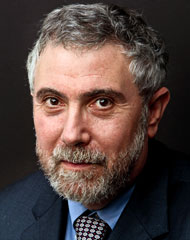 I’m a Paul Krugman devotee. (How can you not be?) His column from this past Monday, Droughts, Floods and Food, had nothing but good sense: rapidly rising food prices have mostly to do with bad weather, namely the fires and drought in Russia and Ukraine this past summer and the floods in Queensland this winter. Now we have a severe drought in China further threatening their food supply which, if it continues to spiral out of control, is going to put further massive pressure on global food prices. (Fun facts: China is now the world’s leading grower of rice – no surprise – but also of wheat, and is #2 in corn.)
I’m a Paul Krugman devotee. (How can you not be?) His column from this past Monday, Droughts, Floods and Food, had nothing but good sense: rapidly rising food prices have mostly to do with bad weather, namely the fires and drought in Russia and Ukraine this past summer and the floods in Queensland this winter. Now we have a severe drought in China further threatening their food supply which, if it continues to spiral out of control, is going to put further massive pressure on global food prices. (Fun facts: China is now the world’s leading grower of rice – no surprise – but also of wheat, and is #2 in corn.)
Krugman, like Joe Romm, makes the connection with climate change. As Krugman says, “…both droughts and floods are natural consequences of a warming world: droughts because it’s hotter, floods because warm oceans release more water vapor.” See the IPCC’s AR4 for much more on the relationship between climate change and agriculture. For more on Food Security and Climate Change, see my FPA sister blog here.
Krugman, it should be noted, wrote eloquently on the last food crisis, in 2008, and how the misguided policies we’ve been pursuing on biofuels has exacerbated the pressure on croplands and food prices. One of his unerringly (and unnervingly) trenchant observations in that column: “And meanwhile, land used to grow biofuel feedstock is land not available to grow food, so subsidies to biofuels are a major factor in the food crisis. You might put it this way: people are starving in Africa so that American politicians can court votes in farm states.”
But here’s my question: Why not meat? By that I mean: Why isn’t meat consumption implicated in how we are so misusing resources? Paul Krugman is a very, very smart guy, but he doesn’t ask the question “Why eat meat?” Meat, with all the implications for contributing to our increasing drawing down of water for irrigation, the pressures on the Brazilian rainforest from soy production (for China’s livestock) and for cattle grazing, with the absurd amount of chemicals and fossil fuels that go into meat production, should be seen as the planet-killing food it is. Krugman writes “It’s true that growth in emerging nations like China leads to rising meat consumption, and hence rising demand for animal feed.” He doesn’t, however, question the basic premise of meat being some sort of essential food. Nonsense. I’ve been a vegetarian for 40 years and have participated in some pretty active sports including marathon running, rugby (for nearly 30 years), and I’m still very much at yoga and downhill skiing.
Others, thankfully, ask the question. Anna Lappé, founder of Take a Bite out of Climate Change, for instance is one very strong voice. I have asked the question here as well. (See various posts.)
Meat is a sacred cow – how ironic is that? – but it seems to me well past time to question what we eat and how that effects the climate.